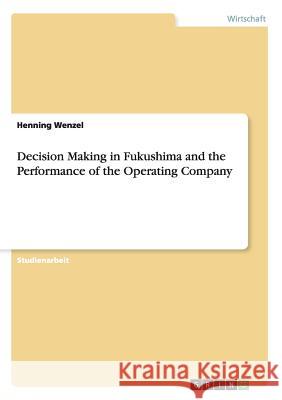Decision Making in Fukushima and the Performance of the Operating Company » książka
Decision Making in Fukushima and the Performance of the Operating Company
ISBN-13: 9783668155398 / Niemiecki / Miękka / 2016 / 36 str.
Studienarbeit aus dem Jahr 2013 im Fachbereich BWL - Unternehmensfuhrung, Management, Organisation, Note: 1,7, FOM Hochschule fur Oekonomie & Management gemeinnutzige GmbH, Koln, Veranstaltung: Soft Skills & Leadership Qualities, Sprache: Deutsch, Abstract: The nuclear disaster in Fukushima Daiichi, Japan may be one of the worst natural disasters in Japans history ever and after Hiroshima in 1945 and Chernobyl in 1986 the third worst nuclear disaster in human history. What is called -3/11- is comprised of three temporally sequenced and causally linked but analytically separable disasters. On 11th March 2011 a Richter scale 9 earthquake occurred, with its epicentre 100km off the northeast coast of Japan. It was followed by a giant tsunami. The quake and tsunami caused a massive amount of damage and resulted in considerable loss of life. It also destroyed the reactor cooling system of the Fukushima Daiichi nuclear power plant complex, which led to massive explosions and the release of radioactive materials into the environment. In todays rapidly changing environment, management personnel, whether in companies, in non-profit organizations or within governmental departments, are constantly confronted with decision problems with far-reaching consequences. This assignment will explain the terms of the decision-making process as well as characteristics of disasters by transferring it on the Fukushima Daiichi disaster in 2011. Besides the introduction and the objectives, the structure of this assignment bases on the explanation and definition of disasters, crisis and their correlation in chapter 2. Chapter 3 explains the rational choice theory as well as the psychology of decisions. The course of the disaster as well as the failures in Fukushima is described in chapter 4. The assignment closes with a conclusion in chapter 5.











